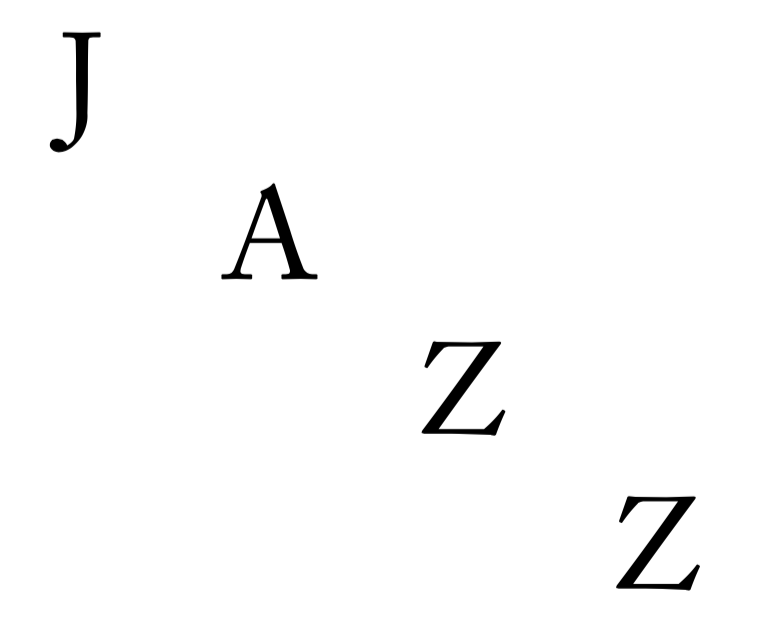"Jazz," A Definition
It's hard to believe that almost a year has passed since I picked up the special acid-free paper at the stationer's and turned in my thesis, a collection of creative nonfiction essays on jazz and my thoughts on it as a young, immature artist. On the occasion of the New Year, I thought I'd share another brief essayette from the thesis—this time on the controversial "J-word" (I previously posted another mini-chapter, "Vibe"). This year marks the Year of the Goat/Sheep/Ram, which also happens to be my zodiac year. The last time my zodiac year came around was about the time I first discovered jazz through Stan Getz, and here I am now. Thanks for reading.
“Jazz”
1. jazz (dʒæz),
n.
a.
A loose set of musical sensibilities most
commonly heard in the background, as in cocktail receptions, sensually lit
restaurants, elevators of swanky buildings, etc.: “This jazz is really nice,
isn’t it, honey? It’s a shame we don’t put it on during dinner more often.”
b.
An improvisatory art form that emerged from a
legacy of longstanding racial oppression in America: “When did ‘jazz’ become a
dirty word?”
c.
Slang for sexual intercourse and related acts
(archaic, slang, used as a verb): “Jazz me, baby.”
On
my 20th birthday, New Orleans trumpeter and bandleader Nicholas
Payton published “On Why Jazz Isn’t Cool Anymore,” a 1000-word obituary for
jazz.[1]
Composed as a series of 126 Tweet-like utterances separated by line breaks, the
post starts, “Jazz died in 1959,” and ends, “Silence is cool.” In between,
there are equations of modern-day jazz performance with necrophilia (“Stop
fucking the dead and embrace the living,” unapologetic self-fashioning (“I
can’t speak for anyone else, but I don’t play jazz / I play Postmodern New
Orleans music”), critiques of racial inequality (“With all due respect to the
masters, they were victims of a colonialist mentality”), and denunciations of
commercialism (“The elite make all the money while they tell the true artists
it’s cool to be broke…[jazz is] a marketing idea”). To stem the circulation of
this problematic word, Payton suggested replacing it with one that acknowledged,
in no uncertain terms, its cultural and historical roots: “Black American
Music” (#BAM).[2]
Off-the-bandstand
conversations started slipping inevitably toward the racially ambiguous
elephant in the room, and diverse responses abounded. Some older, prouder
musicians said, “When did ‘jazz’ become a dirty word? I’m not going to start
being ashamed of jazz.” Other musicians who felt excluded by the perceived jazz
establishment backed Payton online by dutifully expressing their affirmations
of #BAM on Twitter and the like. Of all the responses I heard, though, the one
I most admired was given at a masterclass by trumpeter Dave Douglas, a white,
soft-spoken midcareer artist whose recording credits span diverse musical
sensibilities from folk to hard bop to avant-garde to experimental classical
music.
“Out
of curiosity,” an audience member asked, “let’s say somebody came up to you in
an airport or somewhere and said, ‘Oh, you’re a musician; what kind of music do
you play?’ What do you say?”
“You
know, I usually just say, ‘jazz’” he replied. “The word is really just a marketing
term, but, I mean, it’s also kind
of like a business card because it helps give somebody an immediate frame of
reference. If they’re into jazz and they start asking me about it, then I might
consider giving them the longer, more complicated spiel. But if they’re not,
then they can just say, ‘Oh, cool,’ and be done with it.”
This
answer might seem unsatisfyingly reasonable at first. Where’s the outraged,
socially conscious artist fulfilling his duty of violently shaking the
anesthetized masses into sentience, the lone disrupter fighting the hard fight
against ignorance, prejudice, racism, sexism, classism, etc.? As I’ve gradually
realized, however, the absurdly long parade of historical, cultural, social, economic,
aesthetic, and ethical considerations at stake contained in those four letters
is of little interest to anybody who doesn’t first have a personal stake in the
music itself. That is, the issue here isn’t even that most people, including relatively
well-listened laypeople, are oblivious to the connotational minefield cunningly
laid by the word itself—it’s that most people are oblivious to the music
itself, with its disorientingly porous sonic borders and conspicuous absence of
youth appeal (just look at the graphic design of most modern jazz album covers:
awful).
[1] As
with many other online jazz controversies, I first came across it on Facebook,
the de facto forum for musicians to
spread the word about the latest goings-on, which range from the excessively
banal (“new toothbrush is killing”) to the excessively profound (“it’s simple.
just exist, and deal with the rest as it comes”).
[2] This
bears a possibly uncoincidental resemblance to BAMF and, along with #mfcomn
(“Mother Fuckers Chillin’ On My Nuts,” which you can take to mean what you
will), is Payton’s favorite hashtag on Twitter.

Comments
Post a Comment